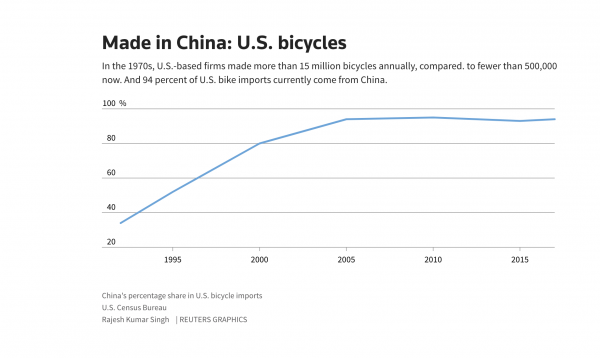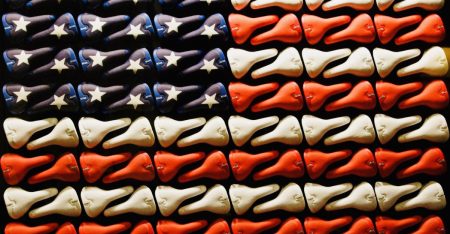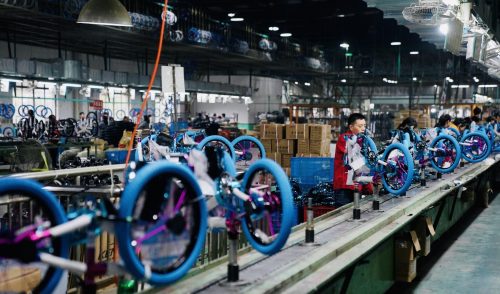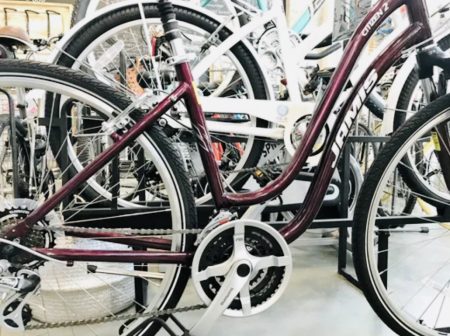

- HOME
- 商品紹介 -ITEM-
- CHIGASAKI STYLE**Bicycle tariffs from China
![]()
2019/06/15 12:34
CHIGASAKI STYLE**Bicycle tariffs from China
by: Naoki Sakai
In the 1970’s, the USA manufactured more than 15 million bicycles. Today, the number is fewer than 500,000, with 94% of imports currently from China. How does the recent USA/China tariff trade war affect bicycle manufacturers and what are they doing to alleviate the stress of consumers required to pay for the extra cost of tariffs to companies importing Chinese bicycles?
US company Trek’s bicycles such as Marlin, FX hybrid, Verve, and their helmets are all Chinese manufactured goods, thus fall into an approximated figure of 30 million dollars a year in tariff cost. US manufacturer Kent International has long depended on Chinese made bicycles for sales, and has decided to invest in shifting production out of China and to Cambodia. They will have to make a 20 million dollar investment to do so, but in the scheme of taxes, it is approximately equivalent to a 1 year tariff of 10%, and the threat has been to raise that tariff to 25% or more, in the near future.
Another US company, Kent will still buy a large portion of goods to make those bicycles in Cambodia with Chinese made parts, but those bicycles made in Cambodia will be allowed to enter the US tariff free, because there is a rule that says as long as a product is derived 35% of manufacturing and labor costs from that country, then it is tariff free.
Other manufactures like US maker Specialized are making moves to manufacture away from China, to Cambodia, Vietnam and Taiwan.
Taiwan is not under Chinese laws of tariffs, however, their biggest manufacturer, Giant, still imports parts and does manufacturing in China. Giant, obviously wants to export bicycles to the US, and although they are not under the tariff rules of Chinese goods, their costs will grow, as Chinese goods will have to rise, due to their own rise of pricing as an effect of the tariff wars. China provides more than 300 million bicycle components accounting to approximately 60% imports of their products in the bicycle industry.
Giant is making a distribution center in the Netherlands, and creating a factory in Hungary, planning to manufacture 300,000 bicycles with a goal of a million bicycles. It is a 72 million dollar expansion plan, made to lower manufacturing costs on Giant bicycle products. Giant is such a huge, the world’s largest, bicycle manufacturing company, that they will necessarily need their suppliers to move closer to their manufacturing plants, so other companies are hugely affected by their decisions.
There are going to be some logistical problems including hiring and training for whichever site a company goes to, whether it is Europe or Asia. For Cambodia and Vietnam, there are other constraints of logistics and infrastructure., including port capacity and labor. Vietnam’s largest 2 ports are 1/6th the size of Shanghai’s largest port, and Cambodia lacks deep water ports to accommodate larger vessels.
There is major risk in moving manufacturing due to the tariffs affecting costs, and it is that the tariff is volatile. It could end at any time, and with the US government currently under quickly changing policies, any move will be met with a wary, but necessary, eye.
Mostly, the high percentage of Chinese made bicycles pertain to the every day riders, children’s bicycles and lower priced bicycles. The higher end market is not quite so affected, because most of them are made in Taiwan and not in mainland China. That means, at least currently, the price of road bicycles and more expensively made ones are going to be less affected, especially here at Y’s Road Chigasaki. I’m writing this because I was wondering about tariffs on the bicycle market. The tariff situation interesting me as to how the world bicycle manufacturers would be affected, and while it isn’t completely assured as to the result, there is some major movement by manufacturers, which eventually, if continued, will affect the Japanese market, as it is a world market, and there are many American brands, made in China and Taiwan, that are sold in Japan. I don’t see the tariffs, at this point, directly affecting our prices, but there likely will be a future effect.
-
住所:神奈川県茅ヶ崎市中海岸4丁目12986番52号 サザンビーチヒルズ2F
電話番号:0467-84-1555
営業時間:月~金 11:00~19:00、土日祝 10:00~19:00
定休日:火曜日
サザンビーチヒルズの駐車場に限ります

カラーコーンが設置してあるスペースは他テナント様の月極駐車場です。
ワイズロード茅ヶ崎店にご来店の方はご利用いただけませんのでご注意ください。
m(._.)m


















